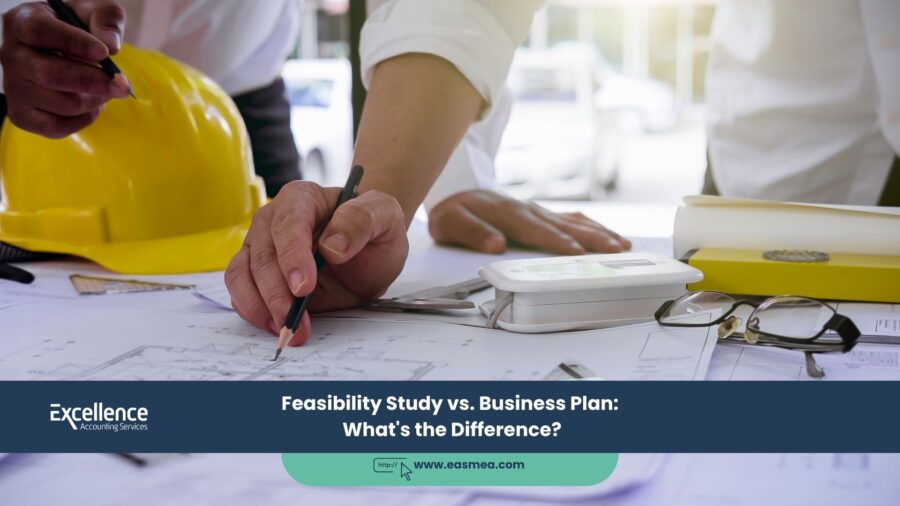Feasibility Study vs. Business Plan: What’s the Difference?
In the exhilarating journey of transforming a brilliant idea into a thriving business, entrepreneurs are often told they need two critical documents: a feasibility study and a business plan. However, many use these terms interchangeably, viewing them as one and the same. This common misconception can lead to wasted time, misallocated resources, and flawed decision-making at the most critical, early stages of a venture.
- Feasibility Study vs. Business Plan: What's the Difference?
- What is a Feasibility Study? The Investigation
- What is a Business Plan? The Roadmap
- The Core Differences at a Glance
- From Idea to Execution with Excellence Accounting Services (EAS)
- Frequently Asked Questions (FAQs)
- Have a Great Business Idea? Let's See if It's Viable.
While both documents are essential planning tools, they serve distinct purposes and answer fundamentally different questions. A feasibility study is an investigative tool designed to determine if an idea is viable in the first place. A business plan is a strategic roadmap that outlines how to execute that idea. Think of it this way: the feasibility study asks, “SHOULD we do this?” while the business plan asks, “HOW will we do this?”
Understanding this crucial distinction is the first step toward building a successful enterprise in the competitive UAE market. This guide will provide a clear, in-depth comparison of a feasibility study and a business plan, outlining their unique components, objectives, and the vital role each plays in your journey from concept to reality.
Key Takeaways
- Different Questions: A feasibility study answers “Can this work?” and “Should we proceed?”. A business plan answers “How will we make this work?”.
- Different Timing: The feasibility study is conducted **before** the business plan. You must first determine if the idea is viable before you create a detailed plan to execute it.
- Different Purpose: The purpose of a feasibility study is investigation and analysis, leading to a “Go/No-Go” decision. The purpose of a business plan is strategy and execution, serving as a roadmap for management and a tool for investors.
- Different Audience: A feasibility study is primarily for internal decision-makers and founders. A business plan is written for a broader audience, including investors, lenders, and key management personnel.
- One Validates, the Other Plans: Skipping the feasibility study is like building a house without checking the foundation. You might draw up beautiful blueprints (the business plan), but the entire structure could collapse if the ground isn’t stable.
What is a Feasibility Study? The Investigation
A feasibility study is a preliminary analysis undertaken to determine and document a project’s viability. The objective is to uncover the strengths and weaknesses of a proposed venture, the resources required to see it through, and ultimately, its prospects for success. It is a calculated, objective assessment designed to save entrepreneurs from investing significant time, money, and effort into an idea that is destined to fail.
A comprehensive feasibility study is not just a gut check; it’s a structured investigation that typically examines four key areas:
- Market Feasibility: Is there a real, sustainable demand for your product or service in the target market? This involves analyzing the industry, potential customers, competition, and market size.
- Technical Feasibility: Do you have the necessary technology, equipment, and technical expertise to produce the product or deliver the service? This assesses the practicalities of the technical resources required.
- Financial Feasibility: Can this business be profitable? This is the most critical component, involving projected startup costs, operating costs, revenue forecasts, and key financial metrics like break-even point and return on investment (ROI). It’s a high-level financial check.
- Operational Feasibility: How will the business be run? This looks at the management team’s capabilities, the legal and corporate structure, staffing requirements, and other operational logistics.
The ultimate outcome of a feasibility study is a clear recommendation: **Go** (the project is viable, proceed to the business plan), **No-Go** (the project has fatal flaws, abandon it), or **Go with Revisions** (the project is viable but requires specific changes to be successful).
What is a Business Plan? The Roadmap
If the feasibility study gives a “Go” signal, the next step is to create the business plan. A business plan is a formal, written document that describes in detail how a business—usually a new one—is going to achieve its goals. It lays out a written plan from a marketing, financial, and operational viewpoint.
While the feasibility study is investigative, the business plan is strategic and persuasive. It’s the master document you’ll use to run your company and is essential for securing funding from investors or loans from banks. It takes the validated concepts from the feasibility study and fleshes them out into a detailed, actionable strategy.
A standard business plan, often prepared as part of a business consultancy engagement, includes:
- Executive Summary: A concise overview of the entire plan, highlighting the key points for busy readers like investors.
- Company Description: Details about the business, its mission, vision, and competitive advantages.
- Market Analysis: A deep dive into the industry, target market, and competitor analysis (building on the findings of the market feasibility).
- Organization and Management: The corporate structure, ownership details, and profiles of the key management team.
- Products or Services: A detailed description of what you are selling, focusing on customer benefits.
- Marketing and Sales Strategy: How you will reach your target market, your pricing strategy, and your sales process.
- Financial Projections: Detailed financial forecasts, including income statements, balance sheets, and cash flow statements for at least 3-5 years. This is a much more detailed version of the financial feasibility analysis.
The Core Differences at a Glance
| Aspect | Feasibility Study | Business Plan |
|---|---|---|
| Core Question | “Should we do this?” | “How will we do this?” |
| Purpose | To investigate and assess the viability of an idea. | To provide a strategic roadmap for execution. |
| Timing | Conducted **before** the business plan. | Developed **after** the idea has been deemed feasible. |
| Focus | Analytical and investigative. | Strategic and operational. |
| Audience | Primarily internal (founders, management). | Internal and external (investors, banks, partners). |
| Outcome | A “Go / No-Go” decision. | An actionable plan and a tool for securing funding. |
From Idea to Execution with Excellence Accounting Services (EAS)
Navigating the critical early stages of a business requires both careful investigation and strategic planning. At EAS, we provide expert support for both feasibility studies and business plan development, ensuring your venture is built on a solid foundation.
- Comprehensive Feasibility Studies: Our team conducts rigorous, data-driven feasibility studies that provide a clear, unbiased assessment of your business idea’s viability in the UAE market. We analyze market, technical, and financial factors to give you the confidence to make a Go/No-Go decision.
- Investor-Ready Business Plans: We craft professional, persuasive business plans that not only serve as your operational roadmap but are also designed to meet the expectations of investors and lenders in the UAE.
- Expert Financial Modeling: Our financial reporting experts develop detailed and defensible financial projections, a cornerstone of both a feasibility study and a business plan.
- Full-Cycle Company Formation Support: Beyond the planning documents, we can guide you through the entire process of establishing your business in the UAE, from legal structuring to operational setup.
Frequently Asked Questions (FAQs)
It’s highly inadvisable. Overconfidence is a common reason for business failure. A feasibility study provides an objective, data-driven check on your assumptions. It might uncover a market reality or a financial hurdle you hadn’t considered, saving you from a costly mistake. It’s a relatively small investment to protect a potentially large one.
You will almost always need a **business plan**. Banks need to see a detailed roadmap of how you will operate the business and, most importantly, how you will generate enough cash flow to repay the loan. The financial projections in the business plan are critical for this.
The duration depends on the complexity of the project. A simple venture might take 2-4 weeks to study, while a large-scale industrial or real estate project could take several months of in-depth research and analysis.
No. A business plan should be a living document. While it’s created initially to launch and fund the business, it should be reviewed and updated annually (or more frequently if the market changes) to reflect new goals, challenges, and opportunities. It’s your strategic guide.
Financial feasibility is often the biggest hurdle. An idea might be technically possible and have a potential market, but the startup costs are too high, the price point the market will bear is too low, or the time to reach profitability is too long, making the venture financially unviable.
Yes, and as the founder, your input is essential. However, involving a professional consultant brings objectivity, structure, and expertise. A professional firm has access to market data and financial modeling tools that an individual may not, and they know what investors and banks look for in these documents.
Market research is a component *of* a market feasibility study. Market research gathers data about the market (e.g., surveys, competitor analysis). The market feasibility study then *analyzes* that data to draw a conclusion about whether entering that market with your specific product is viable and makes financial sense.
No. A positive feasibility study indicates that the idea has a high potential for success *if executed properly*. It confirms the foundation is solid. However, success still depends on the actual execution, which is guided by the business plan and the capabilities of the management team.
Absolutely. Even if you are not seeking external funding, a business plan is an invaluable tool for aligning your team, setting clear goals, tracking progress, and making strategic decisions. It forces you to think through every aspect of your business.
If you are an existing business looking to launch a major new product, enter a new geographic market, or undertake a significant expansion, conducting a **feasibility study** for that specific project is highly recommended. You would also update your **business plan** to incorporate this new strategy into your company’s overall roadmap.
Conclusion: First Investigate, Then Execute
In the high-stakes world of business, preparation is everything. The feasibility study and the business plan are your two most powerful preparatory tools. They are not redundant tasks but sequential, complementary processes that guide you from a raw idea to a structured, executable strategy. By first using the feasibility study to rigorously test the viability of your vision, and then using the business plan to meticulously chart your course, you dramatically increase your chances of success and build a venture that is designed to last.
Have a Great Business Idea? Let's See if It's Viable.
Partner with Excellence Accounting Services to conduct an objective, data-driven feasibility study for your UAE venture.




